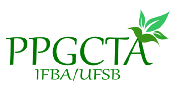Banca de DEFESA: MARCELO SIMOES TESSMANN
Uma banca de DEFESA de MESTRADO foi cadastrada pelo programa.DISCENTE : MARCELO SIMOES TESSMANN
DATA : 16/07/2021
HORA: 09:00
LOCAL: meet.google.com/dih-hebz-amo
TÍTULO:
Título do trabalho 1 em inglês : Survey of bioproducts obtained from vegetable agro-industrial waste: in search of opportunities for the Extrem South of Bahia, Brazil.
Título do trabalho 2 em inglês : Analysis of the economic viability of briquettes production: sustainable income opportunity for new entrepreneurs.
PALAVRAS-CHAVES:
Palavras-chave do trabalho 1 em Inglês: Bio inputs. Sugar cane. Innovation. Reverse Logistic. Environment. Environmental Technology.
Palavras-chave do trabalho 2 em Inglês: Agro industries; Bioeconomy; Biomass; Extreme South of Bahia; Reverse Logistics.
PÁGINAS: 63
GRANDE ÁREA: Ciências Sociais Aplicadas
ÁREA: Administração
SUBÁREA: Administração de Setores Específicos
RESUMO:
Resumo do trabalho 1 em Inglês: to analyze the potential of the elaboration of bioproducts with agroindustrial residues for the cultures of the Extreme South of Bahia, Brazil, by conducting a descriptive survey of the generation that occurred in other regions. Methodology: systematic review was carried out by searching for scientific articles in the SciELO, Scopus and Web of Science databases, using the keywords "bioproduct" and "waste". Relevance: the expansion of agricultural production is increasingly broadened, caused by population growth what results in the generation of greater amounts of waste.Results: the articles reported 74 agro-industrial residues derived from 48 agricultural products that generated more than 200 bioproducts.
Contributions: drastically reduce the impacts caused to the environment, in addition to to add commercial value and increase the profitability of the projects.
Conclusion: biochar, briquettes and fertilizers are the most economically viable processes to be implemented in the Extreme South of Bahia.
Resumo do trabalho 2 em Inglês:
One of the main crops in the extreme south of Bahia is that of sugarcane, which only in 2019 generated, after being processed, approximately 779.2 thousand tons of bagasse, of which 40% (311.7 thousand tons) were not usedand were discarded in the environment. The objective of this investigation is to analyze the viability of the production of briquettes (ecological wood) using bagasse as a secondary raw material, residue in the processing of sugarcane, bringing a new income opportunity for agro-industries in the in the Extreme South of Bahia, Brazil. For the dimensioning of the generation and use of sugarcane bagasse and the briquetting process with this type of waste, an exploratory research was carried out that aims to offer information about its object and guide the formulation of hypotheses. Data collection was carried out through bibliographic research, and direct market research with suppliers. Microsoft Excel was used to perform the financial analysis of the project and verify the Payback, Internal Rate of Return (IRR) and Net Present Value (NPV). The financial analysis, for the production of 54 tons of briquettes per month, showed a net profit after Income Tax of R$ 3,083,606.04 in 10 years, IRR of 128%, NPV of R$ 1,118,003.96, Payback of only 10 months and Minimum Attractiveness Rate above 18%. The financial analysis proved to be attractive for the implantation of an industrial briquette plant using sugarcane bagasse in the extreme south of Bahia, considering the production capacity of the defined industrial plant and the amount of sugarcane bagasse generated in the region.
MEMBROS DA BANCA:
Presidente - 584.180.246-15 - SEBASTIÃO PINHEIRO GONÇALVES DE CERQUEIRA NETO - IFBA
Externo à Instituição - ANDRÉ BURIGO LEITE - IFBA
Externo à Instituição - ROGÉRIO OLIVEIRA DE MELO - IFPE



